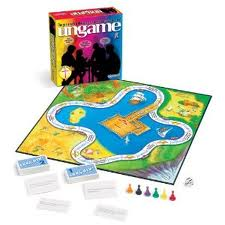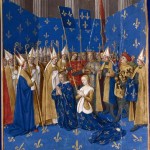Tag: Marguerite of Provence
Happy Valentines Day Marguerite and Jean
Fantasy Casting—Sport of Arm Chair Readers and Writers Alike
I don’t play fantasy sports (real sports either for the record), but as a reader and writer I participate in something similar—fantasy casting. I bet you do too. Certain novels just read like movies, filling my head with images of people, places and situations so vivid that I might be watching the action unfold on a screen. I know EXACTLY who I’d like to see play particular characters in some of my favorite novels but, sadly, no one inHollywood ever rings me up when they are making a movie out of a book and says “cast this baby for us.”
Hence the fantasy casting. Because when real-life constraints—money, an actor’s age, and/or even whether he/she is still among the living—are set aside I can have any book made into a movie starring precisely who I envision in each role. Bliss.
Of course my fantasy cast is not your fantasy cast. And that’s another upside from my point of view. If I prefer Glenda Jackson asElizabeth I (a role she nailed on the BBC before many of you were born) and you prefer Cate Blanchett that’s just fine. We can each pop some popcorn, pull up our respective hassocks, settle down with the very same book in hand and watch the action on the tiny screens in our head featuring our choice. It’s a fantasy remember 🙂
But for some reason while I’ve been busy casting other writer’s historical novels I never thought about a fantasy cast for The Sister Queens . . . until yesterday. That’s when a pair of talented writer friends (Lydia Netzer and Nancy Bilyeau) pointed out how cinemographic my novel is and started making casting suggestions of their own.
Next thing you knew we had a pretty good list going. I knew it was time to share, and more than that to solicit readers’ opinions. So, in a sort of “We’ll show you our if you show us yours” gesture, I am putting our current fantasy casting ideas out on the table and counting on you to reciprocate. Who do you see playing Louis IX? Eleanor? Jean? The Dragon of Castile? DO TELL (that’s what comments sections are made for)!
Fantasy Cast, The Sister Queens:
A Starter List Courtesy of Sophie, Lydia and Nancy
Marguerite: (I’ll admit I see my eldest daughter in this role so thank heavens for the suggestions of others) Romola Garai, Saoirse Ronan, Keira Knightly
Eleanor: (Again my second daughter plays this role in my head): Miranda Otto (remember current age is no impediment), Anna Kendrick, Hailee Steinfeld (right age for start of book but later?), Rooney Mara, Dakota Fanning
Blanche of Castile: Dame Judy Dench, Virna Lisi
Louis IX: Julian Sands (when he was younger), Rupert Penry-Jones (ditto. Or he could play Henry as he currently is), Keith Ledger (told you we included the dead), Alex Pettfer, Raymond Coulthard, Douglas Booth (if he isn’t playing Jean)
Jean de Joinville: Douglas Booth (if you didn’t see him in the recent Masterpiece Great Expectations, click the link—it will be apparent why he is my first choice), Kit Harington (you know, Jon Snow in Game of Thrones), a younger Joseph Fiennes (particular if his brother played Henry), Henry Cavill, Jamie Bell (right age for the start of the action but later?), Jeremy Irvine, Orlando Bloom (who might also play Louis if he put in those contacts he wore for Legolas)
Henry III: Michael Fassbender (yeah he is too good looking – so?), Seth Green, Daniel Auteuil (in younger days), Sean Bean (and for once he wouldn’t have to DIE in a movie), Johnny Lee Miller, Rupert Penry-Jones.
The Crusades: A Laughing Matter?!
What would the weekend be without a bit of crusade humor? In The Sister Queens, Marguerite accompanies her husband Louis IX of France on the first of his crusading expeditions (the Seventh Crusade). She certainly didn’t experience much to laugh about. Particularly when Louis and his knights were captured and she shouldered the responsibility of holdingDamietta and ransoming the knights.
No reason we shouldn’t enjoy a laugh or two at this Horrible Histories explanation of the crusades however. 🙂
Fairytale Pre-Release Day — Bippity Boppity Book and a Visit to Tanzanite’s Castle
Today Holly at Bippity Boppity Book shares her thoughts on The Sister Queens in a marvelous and very favorable review. Holly says:
In Marguerite and Eleanor Sophie Perinot manages to create two characters who are polar opposites but equally interesting and believable.
And she will be:
recommending this to everyone I know who loves historical fiction and putting this author on my “buy immediately” list for her future releases.
And while The Sister Queens is enjoying the star treatment at Bippity Boppity, I am paying a visit to a castle—Tanzanite’s Castle Full of Books—where my hostess Daphne (besides excellent tea and crumpets) has some very insightful questions for me. Stop by for a crumpet and find out how I became a writer and what drew me to the 13th century.
Finally, if you haven’t ordered your copy yet, both Holly and Daphne have copies to giveaway.
On This Day In Her Story #18: Marguerite and Eleanor’s Youngest Sister — Beatrice, Countess of Provence — Marries Into the French Royal Family
January 31, 1246 – On this day (and as a result of the earlier secret conclave at Cluny) Beatrice, Countess of Provence, marries Charles d’Anjou, brother of Louis IX at Aix in Provence.

A list of “medieval celebrities” are present at the marriage, including: the bride’s sister Marguerite (Queen of France) and her husband Louis IX; Blanche of Castile, Dowager Queen of France; the Dowager Countess Beatrice of Provence; and the bride’s prestigious Savoyard Uncles (Thomas and Count Amadeus IV). When the groom complains noisily that the event lacks sufficient grandeur (he had expected a magnificent affair in Sens or Paris), Marguerite is NOT amused. Eleanor of Provence will learn of her sister’s marriage into the Capetian line only after-the-fact, and she will be furious.
On This Day In Her Story #17: Henry and Eleanor Return to England After Spending the Holidays with the French Royal Court
January 1255 – Eleanor and Henry return to England after spending Christmas at the French Royal Court (on route home from Gascony). Louis IX makes Henri III a present – an elephant the King of France acquired on crusade – while Marguerite gives her beloved sister Eleanor a peacock shaped washing bowl encrusted with jewels.
On This Day In Her Story #15: Papal Dispensation Clears the Way for Marguerite and Louis to Marry
I am Game – Using My Son’s Christmas Gift to Get to Know My Characters Better
Writers are always looking for ways to get under their characters’ skins. Only fully realized characters have the ability to make books come to life and please readers. That means knowing far more about each of our characters than readers ever will. We have to “wear” our characters (no, not in a “Silence of the Lambs” way). We have to be able to react instinctively as them to plot points and events in our novels as they arise.
The first step as a historical writer is, of course, historical research. We research, research, and research waiting for that “genesis moment”—the moment when a character’s voice sounds inside our head for the first time. After the “genesis moment” writers have varying techniques for getting to know their characters better (questionnaires, lists of character history and details, etc).
I’ve decided to play a board game with mine. Here, live, on the blog. No kidding.
This year for Christmas my elementary-aged son received “The Ungame.” Don’t feel bad if you’ve never heard of it, I hadn’t either until recently when he started talking about it after playing with a friend. My son is a fairly reticent child – reserved even. So when he came home enthusiastically raving about a game that was all about talking, sharing opinions and feeling, and learning about your fellow players I knew it would be making an appearance under our tree.
As of this writing I have played The Ungame three times. I love the darn thing. It has asked me to reflect upon and answer some pretty significant questions (“What would you do if you were told you were going to die soon?”). I’ve even learned some new things about the man I’ve been married to for more than two decades—a man whose sentences I am fully capable of finishing (though he doesn’t like that so much).
So this morning I thought why not play with my sisters, Marguerite and Eleanor of Provence? Before I begin I hereby declare that I have the actual game board on my desk, that I will be rolling actual dice, and that I will be selecting the top card off the pile (a shuffled pile) when the game requires any player to draw a card. Here goes:
[Sophie—the startling orange game piece—rolls]: 5! That’s an Ungame spot. I get to ask another player a question.
Marguerite, what comes to your mind when you think about your childhood?
[Marguerite of Provence, Queen of France]:
The landscape of Provence; the Court of my father, Raymond Berenger, Count of Provence; and, of course, my sisters. I thought all families were as happy as ours and all courts were as warm and hospitable. [Sighs]
Shall I roll next?
[Eleanor of Provence, Queen of England]:
No Marguerite! It is my turn. We are going clockwise.
[Eleanor—royal purple—rolls]: 6! That’s MightyMountain. Hm, Eleanor has to talk about a time she’s felt challenged by something.
My most recent challenge was acting as Regent of England for nearly ten-months while His Majesty was inGascony. My appointment was outside of English custom and I wanted to do such a good job that none could afterward question the wisdom of Henry’s choice. My largest task was raising money to keep Henry and his troops in the field, and to pay the French to stay out of the conflict. I ended up paying Alphonse of Poitiers (Louis IX ofFrance’s brother) over three-thousand pounds sterling from my own allowance to keep him out of the war.
Your turn Marguerite.
[Marguerite—playing black—rolls]: 1. An Ungame spot. Marguerite draws a question card.
Sophie, to whom can you turn if you need to be comforted?
[Me]:
Doubtless like you, my mind turns immediately to my sister. She’s always loved me unconditionally. If I need to hear a kind word she will provide it—of course if I have a stern word coming she’ll provide that too but only after comforting me.
[All ladies laugh. Sophie rolls again]: 2. An Ungame spot.
[Sophie]:
Marguerite, what is something you want people to remember about you?
[Marguerite]:
That I saved my husband Louis from captivity and likely death in theHoly Land. Because I am quiet and try always to behave in a ladylike manner I fear that people underestimate my will and my ability to act decisively when such action is needed.
[Eleanor rolls]: 5. An Ungame spot.
Marguerite, if you have ever felt ‘brokenhearted’ talk about it.
[Marguerite, hesitates, casts Eleanor a meaningful look, then speaks]:
I have been heartbroken more than once. Early in my marriage I believed myself in love with my husband—I was certainly infatuated. Between the demands of his mother and his God, Louis drew further and further away from me, leaving me very lonely. So Louis broke my heart first, but perhaps nothing is more heartbreaking than the death of a child and I have had that sorrow.
[Marguerite rolls]: 2. Takes a card.
Eleanor, talk about the most loving person you know.
[Eleanor]:
Without doubt my husband Henry. It makes me furious how harshly people judge him. He is no statesman—though it pains me to say it—but he is such a good husband and father. He is entirely faithful to me. There has never been even the rumor of a royal mistress. And he wants me to be happy. He can be a worrier, as during my pregnancy with Edmund when he ordered 1000 tapers kept burning before Saint Thomas Becket’s shrine at Canterbury and another 1,000 at St. Augustine’s, all for the delivery of a second son and my safety. But what woman could fail to see the love underlying such concern? As for the children, Henry is besotted with them. Absolutely besotted.
By the way, am I winning this game? How do we know who wins?
[Me]:
There is no “winner” in The Ungame. It’s an un-competitive learning game.
[Eleanor]:
Pshaw, everything in life has winners and losers. [Turning to Marguerite] But if I must tie then I am happy to do so with my sister The Queen of France.
[Marguerite inclines her head, graciously]
[Me]:
On that happy note I declare our game at an end. Who is in favor of some wine and sugar-coated aniseeds?
How Belva Lockwood Got Me Thinking About Overlooked Women in History
Once upon a time I was young. No, honestly. Then as now I was a history nerd—big time. In fact (trivia alert), I was the first member of my graduating class to declare a major in history. Anyway, one day the younger me was given a postcard by her Woman’s History professor. A postcard showing the black and white image of Belva Lockwood. This image as a matter of fact. 
It took me a while to discover the importance of this gift, delivered, as I remember it, with no real explanation beyond the mild-mannered comment, “I thought you might like this.” With age and distance I now realize my professor gave me the postcard to galvanize me to action; to make me angry—not at him but at the way history was taught and who got left out. You see Belva Lockwood was the first woman to have her name on the ballot for President of the United States (yes, I know Victoria Woodhull “ran” but her name did not appear on official ballots and votes for her were never tallied). She was also the first woman to be admitted to practice before the Supreme Court (though mind you she had to write to President Grant just to get the law diploma she’d earned and it took an act of Congress to see her admitted before the High Court). But I’d never heard of her.
That DID make me angry, and it also made me think. Just what does a woman have to do to be noticed, historically speaking? Give birth to a King? Have her head chopped off? How can that be when there were so many women throughout history who did so much more? Even today, Belva remains only the tip of the “over-looked” iceberg. And because we continue to under-represent women in history and underestimate their activities readers—both of non-fiction history and historical fiction—often think writers get it WRONG when they accurately report what historical female characters did.
I recently saw an example of this in a book review. A reviewer took Author X to task because her female main-character pressed her right to rule her own territories. “How dare the author suggest,” and I am paraphrasing here, “that a woman in the Middle Ages would assert such authority, or would even have the desire to rule in her own right!” The reviewer went on to castigate Author X for imposing modern feminist ideas on long dead women. But the truth is plenty of women held territory (and titles) in their own right during the time period of the author’s book. The reviewer was just wrong—likely because he/she had never heard of such women. I remember wondering what said reviewer would make of the fact that my main characters’ uncle, Thomas of Savoy, was Count of Flanders only by marriage and lost that title when his wife died and her title passed to her SISTER. My guess is the particular reviewer would think that bit of history was made-up, feminist-revisionism as well.
It is time to recognize, as consumers of history and historical fiction, that women have filled many, varied, roles throughout the centuries—even if we haven’t always heard about them. Some women did extra-ordinary things with those roles (e.g. just like male rulers, some female rulers were better at it than others), but the fact women held such roles wasn’t, in and of itself, necessarily as extraordinary as modern audiences seem to think. In each period of history we need to look at the specific facts rather than relying on broad assumptions. For example, to assume things were necessarily better for women later in history than they were earlier is to incorrectly posit a linear progression in women’s rights and opportunities.
I am happy to say that, imo, there’s a lot of really wonderful historical fiction celebrating women who have been historically overlooked these days. There are also fabulous books that examine “big name” historical women in new ways—as more than “ornaments of royal courts” or “mothers of kings.” Personally, I am very interested in telling the stories of women who are more obscure than they deserve to be. Probably because of that darned postcard. When I stumbled upon a footnote in a history of Notre Dame de Paris about Marguerite of Provence (her image is carved over Notre Dame’s Portal Rouge) and her sisters I had a Belva Lockwood moment. Clearly these young women (all of whom made significant political marriages) were celebrities of the High Middle Ages. Marguerite and Eleanor were the queens of France andEngland for heaven’s sake! Yet I had never heard of them. I made up my mind right then to tell their story.
I wish Professor T was alive today. I’d send him a copy of my book and I’d put the Belva Lockwood postcard in it—as an excellent bookmark and a thank you of sorts.
On This Day In Her Story #11: Marguerite’s Mother-In-Law, Blanche of Castile, Dies.
November 27th1252: Louis IX of France’s beloved mother, Blanche of Castile, dies. On her deathbed she “takes the veil” wearing it over her crown.

It will take months for the French King (who is on crusade and moving from place to place in the Holy Land) to hear of the Dowager Queen’s death. Unlike Louis, Marguerite will not be saddened by the news.




